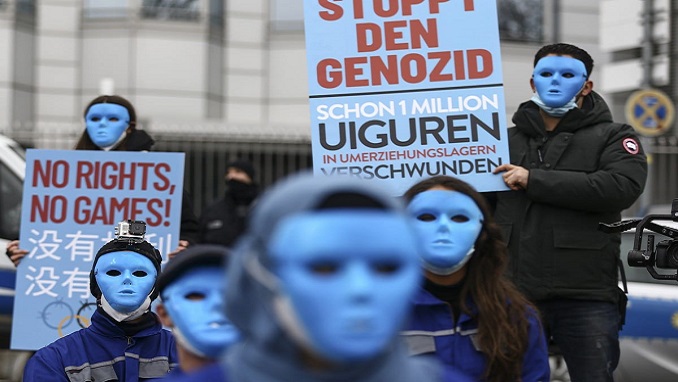The Xinjiang autonomous region in China is facing the worst kind of cultural and ethnic genocide by Beijing. There is a long history of dissonance between the indigenous ethnic Uyghurs and the Chinese authorities, Middle East Monitor’s opinion piece says.
The government refuses to categorise Uyghurs as an indigenous population and describes them instead as a regional minority. One among China’s fifty-five ethnic minorities, Uyghurs are an ethnic Turkic group originating from central and eastern Asia. China is facing worldwide condemnation over its harsh treatment of the Uyghur Muslims. The evidence is mounting up.
A Uyghur-Kazakh citizen, Gulbahar Jelilova, has said that she was beaten ruthlessly and raped while in custody. Stew Chao, a journalist working with Al Jazeera, reported that Abduveli Ayup, a prominent Uyghur writer, activist and Uyghur language defender was put in a detention centre and tortured.
Evidence also suggests that China is targeting Uyghur Muslims systematically with state-planned birth control. According to Zumrat Dawut and Kalbinur Sidik, who survived Chinese detention camps, have claimed that Uyghur women who conceive more than three children are sterilised forcefully. Women survivors from these camps report that they were beaten, raped and given mystery injections.
A study of camp survivors suggests that the Chinese authorities have adopted brutal methods to reduce the number of births in the Uyghur community. These include forced pregnancy checks; medication to stop menstruation; forced abortions, sterilisations and the insertion of IUDs (Intrauterine contraceptive devices); and “mystery injections”.
Person to person outreach suggests that those who were imprisoned and kept in so-called official “education camps” have experienced the worst kind of brutality. They have been beaten mercilessly, tortured and interrogated. They are accused of crimes that they have not committed.
Muslims in Xinjiang face psychological as well as physical abuse. They have been forced to criticise their faith and basic Islamic values, and recite communist party propaganda as part of the indoctrination process.
The authorities in Beijing claim that these camps have benefited millions of workers through educational and vocational training. However, according to testimony from survivors, this is a sham; they are places where human rights are violated daily. Uyghur Muslims are detained for inconsequential matters, such as publishing a story ten years ago or learning the Qur’an. Some have revealed that they were detained because they travelled abroad or simply learned some Uyghur history.
Political analysts believe that the situation in Xinjiang is gruesome, and the response from the international community is weak. Governments generally don’t want to affect their economic ties with China. However, one positive development recently is that some British MPs spoke out against human rights violations in Xinjiang and urged sports officials and athletes to boycott the 2022 Beijing Winter Olympics.
A strong international response is required to push back China’s attack on human dignity. US President Joe Biden has reaffirmed America’s agenda to counter China on human rights abuses. During his first phone call as president to his Chinese counterpart, Xi Jinping, Biden levelled a series of attacks regarding China’s alleged human rights abuses. This provides some hope for the Uyghur movement.
Such support is essential, and has been forthcoming from some western governments, as well as civil society groups and individuals. There is a lot of work to do, not least because China has a long history of discrimination against the Uyghurs.
Since 1949, such discrimination has been framed within the context of “national security”. Moreover, Beijing politicises its foreign investments and cooperation to fulfil its goals. In this way, it looks as if China has bought the silence of many countries, many of them Muslim states and dictatorships. Even Washington puts its economic interests over and above human rights to some extent.
Nevertheless, the Uyghur movement has support in the US, Britain and Turkey. Humanitarian and human rights organisations are working to organise Uyghur and non-Uyghur solidarity groups. What we need now are more Uyghur advocates, international platforms and support around the world.
Governments need to use diplomatic pressure on Beijing to develop its political structures to allow the Uyghurs to maintain their identity and co-exist peacefully with the majority community. China needs to rethink its policies and bring about political changes that accommodate its minorities.
Meanwhile, the Uyghurs are surviving in the diaspora, and are increasingly vocal and well organised in advocating for their rights in Xinjiang. Even so, in order to influence parliaments around the world to speak out on their behalf, individual supporters and activists need financial support.
The independence movement needs proper guidance from the international community. The member states of the Organisation of Islamic Cooperation (OIC) are being cowed by Chinese power and some stand accused of aiding and abetting China’s genocide of the Uyghurs.
China has a very clear economic stranglehold on the Muslim world. That must change if an end to the discrimination and human rights violations against the Uyghurs are to be stopped.
